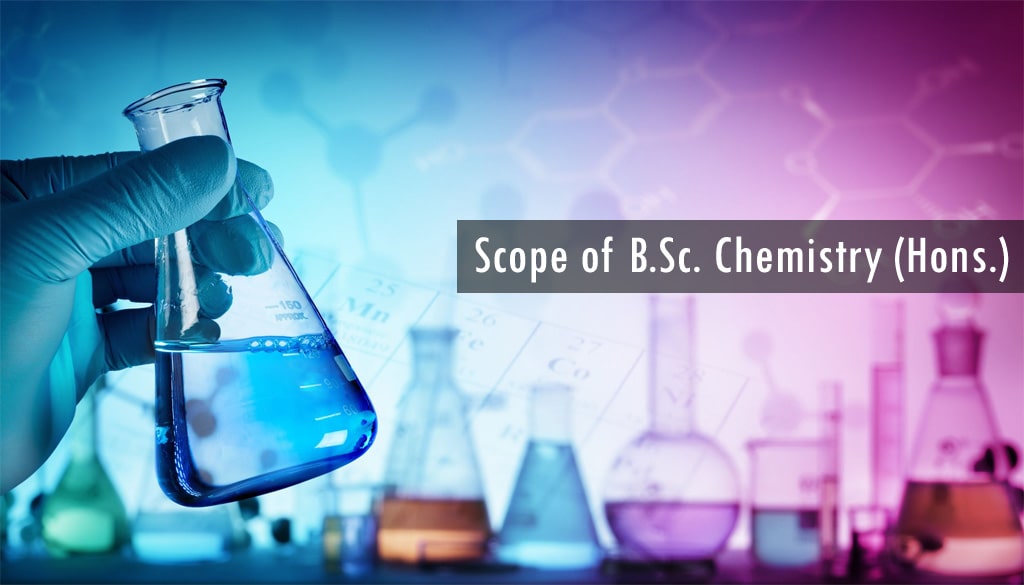
Scope after B.Sc. Chemistry (Hons.)
A degree in chemistry opens the door to a variety of careers in Chemistry, Biology, Physics and other natural sciences. Many students who have completed B.Sc. (Hons.) Chemistry prepare for a career as a chemical engineer, chemist, physicist or even as an engineer in other fields.
Chemistry is the study of matter, and understanding chemistry means understanding the world around you and how one can identify the central ideas underlying chemistry, such as the basic principles of chemistry and its relationship to biology and physics. Those who study Chemistry (Hons.) can also be experts in health-related areas such as nutrition, medicine and health care, as well as in chemistry
What After B.Sc. Chemistry (Hons)?
Chemistry graduates have much more to explore rather than traditional jobs as research assistants in chemical laboratories; they can pursue further training to earn a master’s and doctorate. The most popular concentration of the Department of Chemistry is application of theoretical concepts through research oriented curriculum. Students who pursue B.Sc Chemistry (Hons.) and advanced studies in Chemistry can use their chemical background and are suitable for a variety of professions in the field of chemistry as well as in other disciplines.
Depending on the interest, students can work in polymers, water detoxification, organometallics, electrochemistry etc… or carry out analyses in laboratories under guidance of expert faculties.
List of M.Sc. Specializations to Pursue after B.Sc. Chemistry
- Physical Chemistry
- Organic Chemistry
- Inorganic Chemistry
- Analytical Chemistry
- Biochemistry
- Geochemistry
- Forensics
- Material Science
- Green Chemistry
- Food Technology
- Agriculture Chemistry
- Environmental Science
Top Career Opportunities and Jobs after B.Sc. Chemistry (Hons.)
In recent years, various new career avenues have opened up in the areas where applied chemistry is used. A professional chemist is often presumed standing at a workbench in an industrial laboratory, carefully manipulating chemical instruments. Below are the career trends and career opportunities for Chemistry graduates
Forensic Scientists: The criminal justice system needs chemists to work as forensic scientists and provide evidence to the courts using modern techniques. Research in the chemical sciences brings theories of chemical compounds to the forefront of forensic research and the development of new methods for analysing chemical substances.
Career as a Professional Chemist: Degree in chemistry offers opportunities in many different fields, including science, research, business and healthcare. It can be quite satisfying, as many people are attracted to laboratory work which they enjoy. However, there are a number of ways in which a chemist can conduct laboratory research to prepare you for a career as a professional chemist in a variety of fields such as medicine, healthcare or business.
Analytical Chemists: Analytical chemists use their skills and expertise to analyse substances and identify which components are present, how these components behave and react with each other. This includes analysing medicines, foodstuffs and other products to determine their effectiveness and quality and to ensure that they are safe for human consumption and use. Research chemists use the research to manufacture and improve industrial products such as new drugs and medical treatments.
Drug Development: Drug development is another area that includes the development of new drugs and medical treatments, as well as the application of chemistry to other areas of life sciences.
Forensic Research: Forensic careers are on the rise as the techniques used in forensic research continue to evolve. Chemical experts must carry out analyses in accordance with existing guidelines to ensure that they are up-to-date with scientific developments.
After pursuing higher studies in Chemistry, i.e. M.Sc. in Chemistry, students can get a job opportunity in Pharmaceuticals; Chemical Analysis and Synthesis, Quality Control and Quality Assurance; Patent practice, Environmental Law, Forensic Science Lab. Technical Writing, Environmental Conservation & Sustainability, Research Labs.
Written By:- Dr. Priti Gupta,Associate Head, Department of Chemistry, MRU



